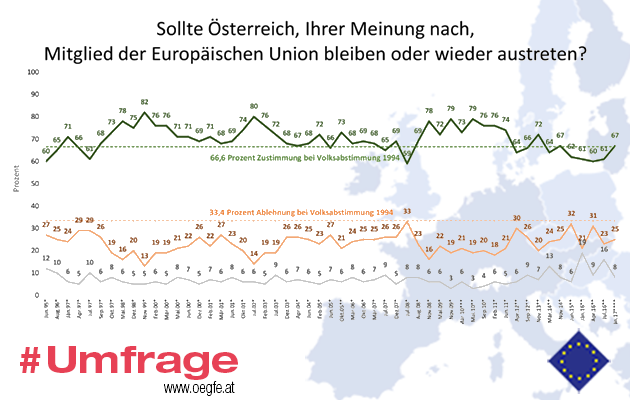Die Zustimmung zur Mitgliedschaft Österreichs in der Europäischen Union ist im vergangenen halben Jahr angestiegen. Dies zeigt eine aktuelle Umfrage der Österreichischen Gesellschaft für Europapolitik (ÖGfE), die Mitte Jänner durchgeführt wurde. Wie eine ÖGfE-Zeitreihe seit dem Jahr 1995 deutlich macht, waren die BefürworterInnen von Österreichs EU-Mitgliedschaft stets klar in der Mehrheit.
67 Prozent der befragten ÖsterreicherInnen sprechen sich derzeit dafür aus, dass unser Land EU-Mitglied bleibt. 25 Prozent plädieren für einen Austritt. 8 Prozent beziehen keine Stellung. Gegenüber Juli 2016 ist die Zahl der BefürworterInnen der Mitgliedschaft um 6 Prozentpunkte gestiegen. Die Zahl jener, die für einen Austritt aus der EU plädieren, hat sich um zwei Prozentpunkte erhöht. Rückläufig ist hingegen die Zahl jener, die sich ihrer Entscheidung unsicher sind und „weiß nicht“ antworteten – sie beträgt aktuell 8 Prozent (Juli 2016: 16 Prozent).
Insgesamt 53 österreichweite ÖGfE-Befragungen seit Juni 1995 zeigen, dass – trotz Schwankungen – die BefürworterInnen der EU-Mitgliedschaft stets in der Mehrheit waren. Im Durchschnitt lag die Zahl der MitgliedschaftsbefürworterInnen bei rund 70 Prozent, die Zahl der GegnerInnen bei 23 Prozent. Die höchste Zustimmung zur EU-Mitgliedschaft fand sich im Juni/Juli 2002 (80 Prozent), der stärkste Wunsch nach einem Austritt im Juni/Juli 2008 (33 Prozent).
Männer befürworten in der aktuellen Umfrage zu 64 Prozent die EU-Mitgliedschaft Österreichs, Frauen zu 70 Prozent. Der Wunsch nach einem EU-Austritt liegt bei den männlichen Befragten bei 31 Prozent, bei den weiblichen bei 20 Prozent. Während Befragte mit Universitätsabschluss zu 91 Prozent für den Verbleib Österreichs bei der EU plädieren (EU-Austritt: 7 Prozent), sind es bei Personen mit Matura 83 Prozent (EU-Austritt: 13 Prozent). Bei Befragten mit Berufs- und Handelsschulabschluss lautet das Verhältnis 63 Prozent („bleiben“) zu 30 Prozent („austreten“), bei Befragten mit Pflichtschulabschluss 57 Prozent („bleiben“) zu 30 Prozent („austreten“). [Fehlende Werte = „weiß nicht/Keine Angabe“].
Die Umfrage wurde von der Sozialwissenschaftlichen Studiengesellschaft vom 11. bis 16. Jänner 2017 im Auftrag der ÖGfE durchgeführt. Befragt wurden österreichweit 607 Personen per Telefon (repräsentativ für die österreichische Bevölkerung ab 16 Jahre/Gewichtung nach Geschlecht, Alter und Bildung). Maximale Schwankungsbreite ca. +/- 4,0 Prozent. Differenz auf 100 Prozent aufgrund gerundeter Werte.
Weitere interessante Artikel
23. Juli 2024
Krone TV “Nachgefragt”: Wichtige Wahl für EU – Harris gegen Trump
Paul Schmidt spricht im Krone TV-Interview über die Bedeutung des US-Wahlkampfs für die EU, die Sicht der Europäischen Union auf Ungarns aktuelle Ratspräsidentschaft und die Prioritäten der wiedergewählten Ursula von der Leyen.
22. Juli 2024
Puls24 NEWS: EU-Parlament kommt erstmals seit Wahl zusammen
Paul Schmidt, Generalsekretär der österreichischen Gesellschaft für Europapolitik, spricht im Puls24 NEWS Interview über die erste Sitzung des EU-Parlaments nach der EU-Wahl im Juni. Als mögliche Themen werden die Neubesetzung zahlreicher Spitzenjobs und der Ratsvorsitz Ungarns erwartet.
11. Juli 2024
The European Union in Search of Its Own Mythology
By: Olena Pokotilo
The attractiveness of the European Union is based on its economic and social model as well as on its manifold national cultural heritage. Throughout the post-Cold War period, the EU has not actively promoted pan-European myths and struggles today with creating a cohesive and credible common narrative. In this context, the author of this Policy Brief argues that to maintain its unity amidst global instability and evolving political landscapes, the EU must develop new, meaningful myths. She discusses the characteristics of the myth-design of the Union and offers policy recommendations.
The attractiveness of the European Union is based on its economic and social model as well as on its manifold national cultural heritage. Throughout the post-Cold War period, the EU has not actively promoted pan-European myths and struggles today with creating a cohesive and credible common narrative. In this context, the author of this Policy Brief argues that to maintain its unity amidst global instability and evolving political landscapes, the EU must develop new, meaningful myths. She discusses the characteristics of the myth-design of the Union and offers policy recommendations.
Neueste Beiträge
Weitere interessante Artikel
23. Juli 2024
Krone TV “Nachgefragt”: Wichtige Wahl für EU – Harris gegen Trump
Paul Schmidt spricht im Krone TV-Interview über die Bedeutung des US-Wahlkampfs für die EU, die Sicht der Europäischen Union auf Ungarns aktuelle Ratspräsidentschaft und die Prioritäten der wiedergewählten Ursula von der Leyen.
22. Juli 2024
Puls24 NEWS: EU-Parlament kommt erstmals seit Wahl zusammen
Paul Schmidt, Generalsekretär der österreichischen Gesellschaft für Europapolitik, spricht im Puls24 NEWS Interview über die erste Sitzung des EU-Parlaments nach der EU-Wahl im Juni. Als mögliche Themen werden die Neubesetzung zahlreicher Spitzenjobs und der Ratsvorsitz Ungarns erwartet.
11. Juli 2024
The European Union in Search of Its Own Mythology
By: Olena Pokotilo
The attractiveness of the European Union is based on its economic and social model as well as on its manifold national cultural heritage. Throughout the post-Cold War period, the EU has not actively promoted pan-European myths and struggles today with creating a cohesive and credible common narrative. In this context, the author of this Policy Brief argues that to maintain its unity amidst global instability and evolving political landscapes, the EU must develop new, meaningful myths. She discusses the characteristics of the myth-design of the Union and offers policy recommendations.
The attractiveness of the European Union is based on its economic and social model as well as on its manifold national cultural heritage. Throughout the post-Cold War period, the EU has not actively promoted pan-European myths and struggles today with creating a cohesive and credible common narrative. In this context, the author of this Policy Brief argues that to maintain its unity amidst global instability and evolving political landscapes, the EU must develop new, meaningful myths. She discusses the characteristics of the myth-design of the Union and offers policy recommendations.






